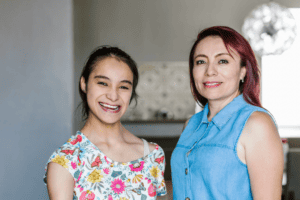Does your child have special needs? Is he or she also exceptionally bright or gifted in certain areas? If you answered “yes” to both of these questions, your child may be twice exceptional.
What Does Twice Exceptional Mean?
Wrightslaw defines twice exceptional (2e) children as those who “are gifted [with] above average abilities [and] have special educational needs, [such as] AD/HD, learning disabilities, Asperger Syndrome, etc.”
They also point out a common challenge for 2e children, which is “because their giftedness can mask their special needs and their special needs can hide their giftedness, they are often labeled as ‘lazy’ and ‘unmotivated’.” Rather being seen and treated this way, what these children need is a rigorous curriculum in the area(s) of their giftedness.
How Does a Twice Exceptional Child Present?
Twice exceptional children often fly under the radar because their giftedness overshadows their needs or their needs overshadow their giftedness. For example, my daughter, Kristen, came out of a doctor’s appointment recently and the doctor pulled me aside, saying, “She asked me which time of day I liked best, and when I paused to think, she said ‘I love when the sun is up, but perhaps you prefer evening when night falls?'” I hesitated, then realized what the doctor was thinking, and chuckled.
Kristen’s language is similar to that of an eight-year-old who grew up in 19th century England: proper, empathetic, and beyond her four years. She’s also passionate about learning, dancing, and is a puzzle-solving master. In addition to these gifts, Kristen also has ADHD and anxiety. Both of which require therapies and supports. Kristen is twice exceptional.
My son Jack is similar to my daughter in this way. He started reading when he was two years old and consistently scores in the top 1% in spelling and vocabulary. He also has autism, ADHD, anxiety, and IBS. These challenges require special education supports and therapies in the classroom. Conversely, Jack also needs challenging material to keep up with his fifth grade reading level (he’s in 1st grade). Jack is twice exceptional.
Does IDEA (Individuals with Disabilities Education Act) protect twice exceptional children?
The short answer to this question is yes. However, it can be difficult to identify them as special needs, because it is masked by their giftedness and vice versa. The National Association for Gifted Children describes this dilemma well:
For many gifted students with a disability, overlapping exceptionalities may render them invisible as either gifted or as students with learning disabilities. As such, they often may not receive either appropriate gifted or special education services that support their unique and complex learning needs.
Additionally, the number of twice exceptional children is important to note. The National Education Association estimates that approximately 6% of students served by IDEA are academically gifted. They also report that every school has twice exceptional students, and through Federal Law, those students’ specific needs must be met.
What Can You Do?
If your child has special needs and is also gifted, you can request accommodations and modifications in their IEP. Every child with disabilities has the right to a free and appropriate public education (FAPE) and this includes twice exceptional children. If you feel your child qualifies for special education services and presents giftedness, your local education agency (LEA) is obligated to evaluate your child regardless of their cognitive skills.It took me several years to realize that giftedness and special needs can go hand-in-hand. Now, I am passionate about helping others uncover their child’s gifts and seek the supports they need.



